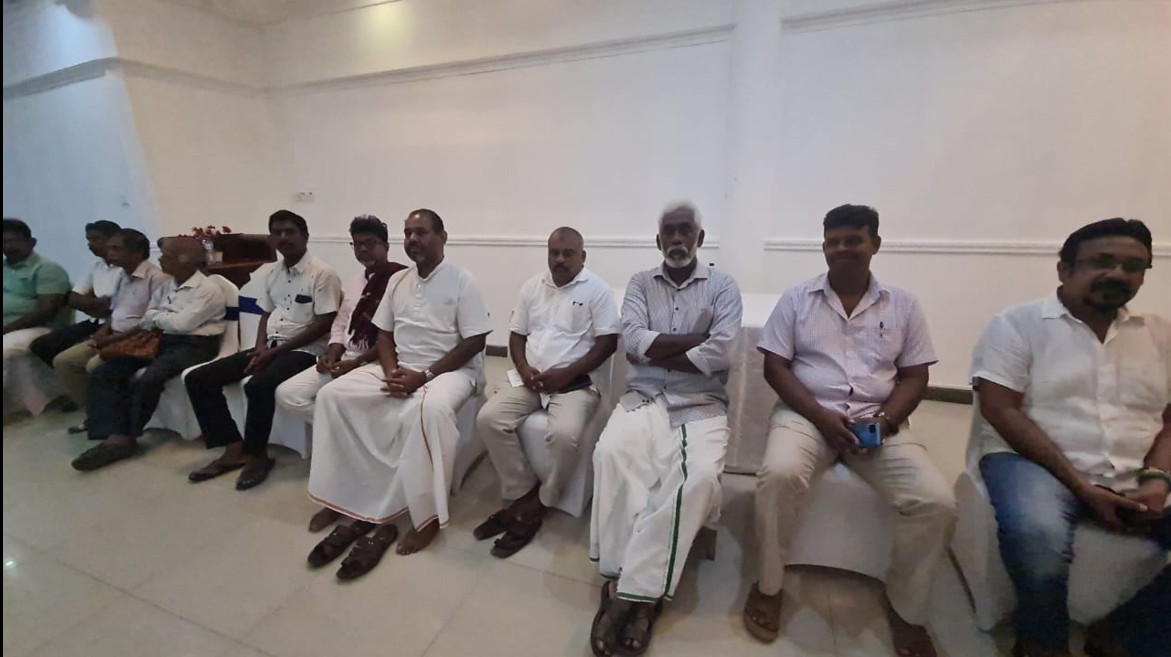Unanimous decision taken to send another letter to the United Nations Human Rights Council
22-Jul-2025.

A unanimous decision has been taken to send another letter to the United Nations Human Rights Council, emphasizing the need for international accountability regarding the genocide committed against the Tamil people and urging that Sri Lanka be brought before the International Criminal Court.
The meeting was organized by the Tamil National People's Front (TNPF), and representatives from political parties aligned with the Tamil national stance, civil society organizations, and relatives of victims participated.
The discussion focused on holding the Sri Lankan government accountable for war crimes, crimes against humanity, and acts of genocide committed against the Tamil people. This gathering was held on July 20 at 10:30 a.m. at the Tilko Hotel in Jaffna.
Participants included representatives of the Tamil National Council led by the TNPF, representatives of the Democratic Tamil National Alliance, religious leaders, civil society activists, members of the Association for Families of the Disappeared, and the academic community of the University of Jaffna.
Speaking on the occasion, TNPF leader and Jaffna district MP Gajendrakumar Ponnambalam stated that accountability remains a major unresolved issue. He noted that the UN Human Rights Commissioner had informed them nearly two months ago about an upcoming visit to Sri Lanka. Human rights organizations from the North and East had sent letters to the Commissioner's office, urging them not to visit Sri Lanka before the UNHRC session in September.
Their concern was that if the Commissioner visited beforehand, the Sri Lankan government might exploit the visit to undermine the resolutions to be tabled in September by making false promises. These actions, the groups feared, would ultimately weaken the resolution and leave the affected communities without recourse. Around 100 human rights organizations from the South also appealed to the Commissioner to delay the visit. Despite this, the Commissioner proceeded with the visit, coinciding with a time when Ponnambalam himself was unable to be present in Jaffna.
He recalled a joint letter sent on January 15, 2021, by Tamil political parties, human rights groups, and activists. The letter listed four key demands from the Tamil people regarding accountability. Notably, Mr. Sampanthan, then leader of the Tamil National Alliance, was among the signatories. Ponnambalam emphasized that this letter remains relevant even today, fully representing the expectations of the Tamil community regarding justice and accountability.
That letter was re-emphasized during the Commissioner's visit to Jaffna. It was handed over on behalf of the Tamil civil society, through Mr. Singham, along with a summary note. He remarked that discussions about accountability are now gradually diminishing and being treated as a mere talking point, with efforts related to the genocide during the war being reduced to near-zero attention.
The most recent UN resolution focuses on internal investigations, urging the Sri Lankan government to conduct inquiries. However, Ponnambalam criticized this stance, pointing out that from 2012, the UNHRC resolutions consistently aimed to investigate events that occurred during the final phase of the war. He highlighted the discovery of a mass grave in Chemmani, which supports claims of genocide, but the government has made no meaningful attempt to investigate it. During Lakshman Kadirgamar’s tenure as Foreign Minister, the government denied the existence of mass graves, calling it a lie and dismissing any responsibility.
Successive governments, including those of Chandrika Kumaratunga, Ranil Wickremesinghe, and Mahinda Rajapaksa, all avoided taking up the issue. The discovery at Chemmani—where it was initially claimed that only 600 bodies had been found—proves otherwise. Chemmani, Ponnambalam argued, offers two critical opportunities: first, to challenge the effort in Geneva to limit investigations to the final stages of the war, and to extend the timeframe to include earlier atrocities; and second, to reignite discussions and investigations into genocide through other mass graves discovered across the island.
He emphasized that the conflict was not merely a war between two parties but a product of historical injustice that pushed the Tamil people to take up arms in self-defense. To arrive at true justice, the whole historical context must be examined—who did what, and why.
Only then will real justice and fairness be achieved. Otherwise, selectively portraying one side of history while ignoring the other and asking for solutions will not yield a fair outcome. Chemmani has reopened that door. Hence, it is now necessary to emphasize a unified and consistent position regarding the entire issue.
Splitting Chemmani from the broader events of the war would severely affect the victims. It is dangerous. The Attorney General’s Department in Sri Lanka acts as legal counsel for the government. If any complaint is made against the state, the same department defends the state and also prosecutes offenders. This structural flaw can only be resolved through an independent prosecutorial office.
However, even if such an independent office is created, it will not address issues arising from ethnic conflict. The problem in Sri Lanka is that the entire state apparatus has become the tool of one ethnic group, acting against others. This view was clearly expressed by former UN High Commissioner for Human Rights Prince Zeid, who stated that an internal mechanism for accountability in Sri Lanka is inappropriate.
He observed that the ethnic conflict has eroded the neutrality of the entire state machinery in Sri Lanka. Therefore, internal inquiries cannot deliver justice for ethnically motivated crimes. As a minimum, there should be a hybrid mechanism. While international inquiry is ideal, even a hybrid system will only be considered acceptable if international parties have full control over it. This was the Tamil position at the time.
Currently, attempts are being made to present the proposed independent prosecutor’s office as a solution to Tamil grievances, but Ponnambalam reiterated that such mechanisms alone would not ensure justice for crimes stemming from Sri Lanka’s ethnic conflict.







